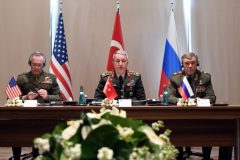
Turkish, Russian and US army chiefs held talks on March 7, 2017 in the southern Turkish city of Antalya to discuss regional issues including Iraq and Syria, the Turkish army said.
/ AFP PHOTO /
by Fulya OZERKAN
Agence France Presse
ISTANBUL, Turkey (AFP) — The top generals of the Turkish, Russian and US military met Tuesday in a bid to step up coordination in Syria and avoid clashes between rival forces in the fight against Islamic State (IS) group jihadists.
The meeting between Turkish Chief of Staff Hulusi Akar, US Chairman of the Joint Chiefs of Staff Joseph Dunford and Russian Chief of General Staff Valery Gerasimov appears to be the first of its kind.
Their discussions in the southern Turkish city of Antalya came as a US-led coalition made progress in its effort to push IS out of Syria.
While Turkey, Russia and the United States are all fighting against IS, they support different camps and tension remains because of Ankara’s opposition to the involvement of Syrian Kurdish militia forces.
Though it ultimately stepped back from its claim, Turkey had threatened to strike Manbij, a former IS bastion, unless the US-backed Syrian Democratic Forces (SDF) deployed there pulled back.
The SDF, seen by the Washington as the most effective anti-jihadist fighting force in Syria, is dominated by Kurdish fighters condemned by Ankara as “terrorists.”
Both Moscow and Washington confirmed the three-way talks in Antalya.
“During the meeting the parties discussed regional security matters in Syria and Iraq … with an effort to wage a more effective fight against all terrorist organisations in the future and the importance of additional measures for de-conflicting operations,” US joint staff spokesman Greg Hicks said in a statement.
‘Risk of unwanted clashes’
The Antalya talks are aimed at ensuring better coordination to avoid “the risk of unwanted clashes” as many countries are involved in Syria, Turkish premier Binali Yildirim said.
Speaking in Ankara, Yildirim said Syria needed to be rid of “all terrorist groups” — including Syrian Kurdish militia and IS jihadists.
“The objective of the meetings today and tomorrow (Wednesday) is how to provide coordination in the best way possible and prevent parties from interfering with each other’s operations and causing unpleasant developments while fighting against terror,” Yildirim said.
The meeting comes a day after Turkey stepped back from threats to unilaterally strike Kurdish militia deployed in Manbij.
“It makes no sense to launch an operation in Manbij without the cooperation of Russia and the United States,” Yildirim said Monday.
His announcement stood in stark contrast to previous threats from Ankara that it would strike the Syrian Kurdish People’s Protection Units (YPG) unless they withdrew from Manbij.
It came after Russian and Syrian regime forces started to move “humanitarian” convoys into Manbij, making it more difficult for Turkish troops to launch the offensive they had threatened.
The YPG is a key fighting force in the SDF, which spearheaded the victories against IS in the flashpoint towns of Kobane and Manbij.
Ankara believes it is linked to the outlawed Kurdistan Workers’ Party (PKK), which seeks greater rights and autonomy for Turkey’s Kurdish minority and has waged a bloody campaign against the Turkish state since 1984.
In a thinly veiled criticism of Washington, the Turkish premier on Tuesday lashed out at “some allies’ unfortunate” choice of Syrian Kurdish militia forces as partners in the fight against IS.
Turkey has said it wants to work with its allies to capture the IS de facto capital of Raqa, but has ruled out any operation alongside the Kurdish militia.
‘Clean Raqa together’
Speaking to a rally of supporters in Ankara, Turkish President Recep Tayyip Erdogan said in reference to the US: “Now we are discussing and saying that if you put aside those terror groups, we can clean Manbij together, we can clean Raqa together.”
The Pentagon said Monday it had sent extra troops into northern Syria to make sure competing forces in and around Manbij remain focused on fighting IS rather than each other.
Ankara has conducted a military campaign inside Syria since late August, backing Syrian opposition fighters and recapturing from IS several towns near its border.
But the Turkish campaign is also aimed at stopping the advance of the Kurdish militia, which Ankara fears could join up its so-called “cantons” in northern Syria, near its border.
Turkey is cooperating with Russia in Syria, despite them being at odds politically over the future of Syrian President Bashar al-Assad, whom Moscow backs militarily.
Erdogan plans to visit Moscow on Friday, to co-chair with Russian counterpart Vladimir Putin a meeting of ministers from both countries, the Turkish leader’s office said in a statement.
© Agence France-Presse








